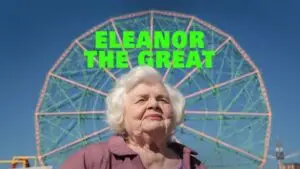Quick Facts & At a Glance.
- Title: The Roses (2025).
- Director: Jay Roach.
- Screenplay: Tony McNamara (based on The War of the Roses by Warren Adler).
- Runtime: 105 minutes.
- Language / Countries: English; United States & United Kingdom.
- Budget: ~$30 million.
- Gross / Box Office: ~$50 million worldwide (some sources).
- Genre / Tone: Satirical black comedy / marital drama with biting edge.
The Roses markets itself as a reimagining (not a direct remake) of The War of the Roses, updating the dynamics of marriage, power, and resentment for a modern age.
Cast — Who’s in It & How Many Principals.
The cast is star-driven with a strong supporting ensemble. The principal list includes:
- Benedict Cumberbatch as Theo Rose.
- Olivia Colman as Ivy Rose.
- Andy Samberg as Barry, a friend of Theo & Ivy.
- Kate McKinnon as Amy, a friend to the couple.
- Allison Janney in a notable supporting role (lawyer / mediator type).
- Sunita Mani, Ncuti Gatwa, Jamie Demetriou, Zoë Chao, Belinda Bromilow, and others also appear in supporting roles.
By combining leads, key supporting names, and ensemble side roles, one can count around 12-15 named cast members with meaningful screen impact.
Who is the “Means Character” / Central Figures.
This is fundamentally a two-hander: Theo Rose (Cumberbatch) and Ivy Rose (Colman) share the central emotional weight. We see their marriage from multiple angles: love, disappointment, ambition, resentment. The narrative is structured so that both characters have arcs (albeit unequal), and the audience is meant to understand their perspectives, even when they cross moral lines.
If we must pick one, Theo perhaps drives more of the conflict in act transitions (job loss, pride, insecurity), but Ivy’s rise in her own sphere (her restaurant success, identity) is the counterbalance. The film’s conflict is relational — the “means” is the marriage itself, embodied by both spouses.
Box Collection & Commercial Performance.
- Budget: ~$30 million
- Gross / Box Office: ~$50 million worldwide (some sources)
- The film opened with around $800,000 in preview night screenings.
- Its Labor Day weekend performance was stronger than expected, with estimates placing its four-day weekend at $7.7 million in U.S. theaters.
Thus, The Roses appears to have performed decently above its production cost thresholds (though marketing and distribution costs may complicate net profitability). Its box office is solid for an adult black comedy/marital satire in 2025.
Niche / What Kind of Film Is It?
The Roses occupies a niche of adult satire / dark comedy about marriage, with strong inroads into relationship drama with bite. Its niche attributes:
- It riffs on the classic “marital warfare” genre (especially The War of the Roses) but tries to modernize it with reversed roles, emotional nuance, and social commentary.
- It blends British sensibility and humor with American settings — part fish-out-of-water & cultural clash.
- It is for audiences who like dark comedies that cut close to real relationship pain — not purely laugh-fest, but satire with emotional edge.
- It is an R-rated, mature film — includes profanity, sexual content, adult conflicts — not a light date movie.
In short: The Roses is for viewers who want something more grownup, more scathing about love, ambition, and domestic power.

Deep Details — Plot, Themes, Strengths & Flaws.
Story & Structure
The Roses begins in a therapy session: Theo and Ivy are prompted to name ten things they love about one another. Their answers are tentative and strained, setting the tone.
Backstory & set-up: Theo was a promising architect; Ivy loved cooking and dreamed of starting her own culinary business. They meet in London, marry, relocate to Mendocino, California, start a family. Over time Ivy’s restaurant gains acclaim; Theo’s career falters. Ivy’s rise shifts the balance.
Because of their success, they own a beautiful dream house. But beneath the polished surface, resentments grow: Ivy feels underappreciated, Theo feels displaced, children and domestic expectations add strain.
As slights mount, alliances shift. Theo’s ego is wounded. Ivy’s ambition grows. Their friends (Barry and Amy) sometimes mediate, sometimes poke. The marital contest escalates: humiliation, passive aggression, betrayal, and sabotage (emotional rather than physical for much of the film).
In the final act the film allows relationships to snap: verbal assaults turn venomous; emotional warfare intensifies. The ending is dramatic — not necessarily a physical demolition, but an emotional showdown that closes the deal in a way that feels earned (though critics debate whether it satisfies).
Themes & Meanings
Power, equality & role reversal
The film explores how shifting power in a marriage (career success, domestic labor, identity) breeds insecurity. Theo’s displacement and Ivy’s ascendancy is central to the tension. The switch forces both to rethink expectations.
Resentment, ego, and unspoken demands
Much of the conflict lies in what is unsaid: expectations, invisible labor, pride, jealousy. The movie uses cutting insults and passive aggression to expose how resentment corrodes intimacy.
The performative marriage & public facades
Because they’re successful, Ivy & Theo must also maintain appearance — social status, image, the lifestyle. That pressure makes their private fissures more dangerous, as neither wants to look weak publicly.
Marriage as battleground & survival
By situating marriage as a war with shifting lines, The Roses asks whether love can survive gradual attrition. It probes whether marriage’s promises include endurance through betrayals.
Adaptation & reinterpretation
Unlike the 1989 version (which leaned more into outré carnage), The Roses aims for emotional realism. The filmmakers insist it is not a remake but a reimagining — focusing on the emotional terrain inside the fight.
Strengths
- Star performances
Cumberbatch and Colman bring gravitas, chemistry, and sharp emotional texture. Critics repeatedly praise how they slice into the roles. - Smart, biting script
Tony McNamara’s dialogue has wit, barbs, and emotional bite. Scenes like the opening therapy list produce tension quickly. - Balance of tone
While critics note that the film softens some edges, many say it attempts (and often succeeds) at mixing humor, hurt, and realism rather than descending into farce. - Production scale & polish
Sets, cinematography, editing, and musical choices feel calibrated: the beautiful house, Californian light, interiors that mirror their polished social surface. - Modern relevance
By recontextualizing marriage dynamics in contemporary life — dual careers, shifting gender norms — the film speaks to modern audiences more than the original’s era might allow.
Weaknesses & Critiques
- Milder than needed
A number of critics say the film is too restrained compared to its premise. It doesn’t always embrace cruelty or satirical bite fully. The “black comedy” label feels diluted. - Tonal unevenness
The comedic styles of the supporting cast (McKinnon, Samberg) sometimes clash with the more emotional and restrained performances of the leads, jarring the flow. - Underdeveloped supporting characters
While Ivy & Theo are fleshed out, many side characters (Barry, Amy, extended cast) feel more like sketches than fully drawn people. - Believability / chemistry issues
Some critics doubt whether their love and hate feel authentic — maybe too much acting, too little livedthrough intimacy. The shift from love to hate sometimes feels abrupt. - Ending ambiguity / emotional payoff
Some say the ending is satisfying; others feel it doesn’t land full force. For a film about conflict, the resolution’s restraint is a point of debate.
Critical Reception & Consensus
- Rotten Tomatoes shows critics find the premise familiar but applaud the lead performances. The consensus calls the mixture of broad comedy + satire “an uneasy marriage,” but watching Colman & Cumberbatch trade barbs is a treat.
- Metacritic gives a score around 58/100 — “mixed or average” reviews.
- Some critics righteously point out that while the film begins with comic force, its stakes soften as it goes, weakening the darkness.
- But many also concede that the film works most strongly when Colman and Cumberbatch are in the ring, exchanging scalding lines.
- Time describes it as a “smart summer movie for adults,” reviving a kind of mature romantic satire that’s become rare.
Final Verdict & Viewing Advice of The Roses Movie.
If you go into The Roses expecting the razors-out, smash-the-house spectacle of the 1989 version, you’ll be disappointed. This film is steadier, more emotionally grounded, and shy of extreme carnage. But if you’re ready for a darker, satirical study of marriage with top-tier performances and sharp writing, there’s a lot of value here.
Go watch it if:
- You appreciate adult comedies that bite, rather than safe romantic fare.
- You want to see two great actors dig into marital conflict with wit and weight.
- You enjoy satire that reflects modern gender, ambition, and identity questions.
Maybe skip or lower expectations if:
- You want bigger spectacle, over-the-top destruction, or cathartic revenge.
- You dislike tonal shift or comedy that veers into darkness.
- You want characters with entirely clear motivations and moral lines.





